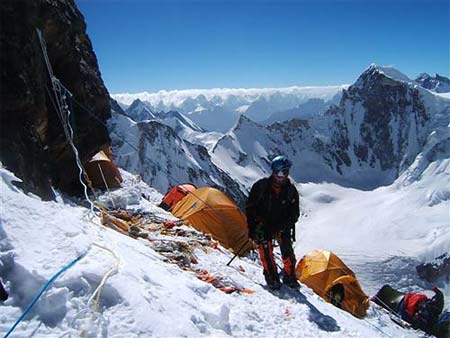I was talking to a mountain guide over the weekend. He’s been on expeditions to the Himalayas and was saying that as a career it’s hard work. Not just because of hypoxia at 8,000 metres, nor falling ice and rock, not even the primitive living conditions. No, his biggest worry was finding money to fund his adventures.
 |
| Easier than the boardroom? |
Get backing for one expedition and if things go well, his problem was going back to the sponsors. They often don’t want to fund a repeat or copycat expedition. After all the supplier of mountaineering equipment or the Swiss watchmaker will have the stock photos and marketing associations from the previous trip. So the only way to lure potential sponsors is to promise something more. It’s not enough to climb Everest, maybe you need to cycle to base camp or try to make break the unofficial record for the fastest climb. It’s a form of inflation, you need to promise more and more.
I can’t help wonder if this isn’t the same with the Grand Tours, especially the Giro. Now don’t get me wrong, I’m already salivating at the prospect of seven summit finishes and know pretty well that I’ll be spending May and July watching the Gazzetta internet broadcast. But what if Zomegnan announces five summit finishes for 2012, will we think the race is softer or more boring? Do race organisers have to keep pushing for more and more in order to keep our interest?
Whilst everyone is praising the Giro and Tour routes for their aggressive routes, I can’t but worry for the riders, especially given the transfers involved between stages. A typical team car will cover double the distance of the Tour de France in July because of the transfers and riders struggle to get food and rest. Maybe you don’t care for this but even the mountain climbers who will be on preferred terrain are quietly worried about all the travel and the inability to recover. It’s certainly a preoccupation of many riders and teams, if the racing is hard then there’s not much time to recover.


I've often wondered how the current routes have lined up against those of the past. I've time and again read lore of regular 300+km epic stages from the early days, back when it was gravel, goat paths and 5 gears, etc. The stages always seemed harder "back then". And by comparison today's stages seem like they are easier, only the competition has gotten stiffer. You never see guys collapsing at the finish line anymore. Not that that is a great thing (it does ad to the drama though). But when he has time to zip up his jersey and polish his sunglasses I have a hard time believing he worked that hard (more likely he just had better drugs…but i digress)
I for one welcome some harder grand tours. Half of the race IS recovery. I don't want to see fresh faces day after day. I don't want to see teams controlling day after day. With 5+ summit finishes I think it will open up the field because no one person or team can dominate under those circumstances.
(Now just take away radios and you got yourself a good race!)
I agree that at some point, the race cannot keep on topping itself, unless it finally breaks down and just throws out 21 repeats of the Zoncolon.
However, one area that the Grand Tours (the Vuelta seemed to pick up on this in 2010) can improve is on the intermediate stages. The TdF apparently thinks this means long, flat and a parade before a 5 minutes sprint. They made amends in 2010 with the cobbles, but they need to look to the Classics, and in combination with a radio ban, can ad excitement to these races without having to continue the ever more extreme mountain stages.
Bring back race strategy, and bring back chances for legitimate breaks and attacks, and perhaps the races can offer fans racing without needing to be ever more extreme in the routes themselves. Look for hills to end each stage on, or add in circuit loops up small, steep climbs to make the sprinters and points contenders work for their points.
Gillis, as a spectator I agree with you but the riders really don't like these transfers. Let's remember that in the past kids climbed chimneys and people worked in dangerous conditions. Today most people, especially in Europe, enjoy very different conditions and the riders aspire to a bit of this too.
One thing I'd look at is shorter stages in the final week. It's something we'll see in the Tour with the 109km Alpe d'Huez stage. We don't need things this short but I tend to think 200km a day in the mountains in the final week is pushing it, it can really drain a rider.
I'm with Anonymous. Innovative middle stages are the key improvements (see Montalcino St7)not the inflation in big mountains. That is getting a bit silly.
I hadn't really addressed the transfers earlier as you had. And you're right, travel time does not equal rest time. Although they can still build a challenging race without them.
But I still think riders, most athletes for that matter, don't appear to suffer like they used to. A modern rider may be more efficient, but is he harder? I'd like to see more Jens Voights and fewer Conti's. The "game" is too strategized and calculated these days. Few take risks anymore. What I would hope to see with these harder grand tours is some of that being forced.